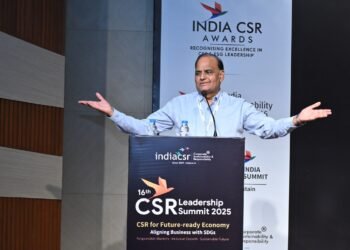For India CSR Interview Leadership Series Harsha Mukherjee talked to Craig Riley, Director, Sustainability Services of AECOM, USA. He says, “AECOM has decreased its carbon footprint by 43% since 2015, far exceeding our 2020 target” and looks to leverage AECOM’s resources “to be part of the vital movement” to address complex sustainability issues. Excerpts of an interview:
How do you differentiate CSR from Corporate Sustainability?
The real difference between CSR and Corporate Sustainability is in their application and in industry usage. Over time, CSR has typically been associated with a company’s philanthropic activities, stakeholder engagement, and related communications. Corporate sustainability has been associated with the company’s operational performance and product/service impact related to various sustainability issues. The terms are not synonymous or interchangeable: Sustainability has always been about more than just responsibility and is more ambitious and forward looking than CSR, while responsibility is largely defined by the current stakeholder landscape, compliance obligations, and other charitable efforts.
What are the Causes close to your heart? How do they serve your company’s interest?
The list of our planetary afflictions is large, and the impacts of our growing human footprint are having real and lasting damage. There are no issues closer to me personally than climate change and loss of biodiversity. These vexing issues challenge our human logic and our ability to grapple with systemic, complex issues with global ramifications. They are also exacerbated by our psychological tendency to deny those afflictions that we cannot directly see or feel. My company, AECOM, is one of the world’s largest sustainability implementation firms, providing services such as green building, sustainable infrastructure, sustainability program development, strategic resource planning and management, and applied environmental science. We look to leverage our company’s resources and be part of the vital movement addressing these and other complex sustainability issues.
What do you believe are the best learning experiences from CSR in your industry?
I believe in learning from inside the organization but being guided by best practices from outside the organization. There are guidelines, frameworks, and consultancies, like my company, that can guide organizations in integrating sustainability into institutional strategies, operations, and capital projects. Yet nothing advances learning better than testing from within the business or organization itself. Sometimes sustainability programs or initiatives have to fail – “fail fast, fail cheap” – as taught in many business schools. If the activity has merit, what will come out of failure and learning is a more robust program. However, organizations have to provide an environment and culture where exploration and, yes, failure, are allowed.
What is your favorite case study from your company?
As a global technical and professional services firm, AECOM works in all aspects of environmental and sustainability management. Our projects range from executive level strategic planning engagements to sustainable infrastructure projects. While we are engaged in many current and exciting corporate consulting projects to advance sustainability, I want to highlight the recent achievement of our own 2020 carbon reduction goal and new pledge. As summarized in a recent press release, AECOM has decreased its carbon footprint by 43% since 2015, far exceeding our 2020 target. We have established a new science-based target, with a commitment to further reduce absolute greenhouse gas emissions by 20% by 2025.
What are the key or top three challenges you have to address as a CSR and Sustainability professional?
Beyond the day-to-day management issues associated with a sustainability program, three of the key challenges in corporate sustainability today are the expectation/need for transparency, fatigue from excessive reporting requirements, and addressing pressure from financial stakeholders. All of these are related and can be more easily addressed when a robust monitoring and performance system is in place that supports ongoing sustainability management.
Disclaimer: The views expressed in this feature are entirely their own.
Terms & Conditions: India CSR Network does not permit other Websites/Agency to copy or reproduce or reprint the above article/feature in any form or means.






















